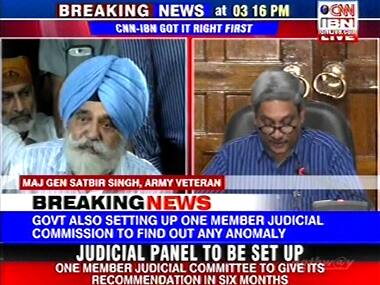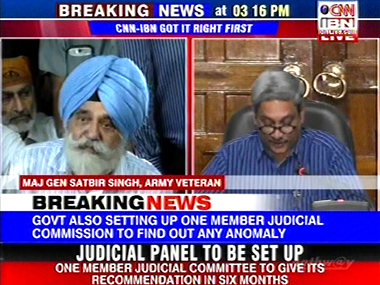Date: September 15, 2013. Venue: Rewari, Haryana. Occasion: First public meeting by the BJP’s Prime Ministerial candidate Narendra Modi. A picture of the Indian Parliament in the backdrop, and a line written in bold above, made it known that this was a rally for ex-servicemen. It was here that Modi made his first public promise, the implementation of a four decade-old demand — One Rank One Pension (OROP). Date: September 5, 2015. Venue: Conference Hall of Defence Ministry in South Block. Occasion: The announcement of the implementation of OROP. Flanked by the three service chiefs, Defence Minister Manohar Parrikar announced the resolution of an issue that had been agitating Indian Armed Forces personnel, both serving and retired for over 40 years. [caption id=“attachment_2422554” align=“alignleft” width=“380”] Major-General Satbir Singh (left) and Defence Minister Manohar Parrikar (right). IBNLive[/caption] This was a big day for veterans — from the rank of jawan to the service chiefs. It was an equally big day for the Modi government and the BJP, as they prepared to deliver their one big promise — a complex issue that has dogged the Modi government since assuming office, and something that successive governments for the past 40 years, including the Atal Bihari Vajpayee government, have failed to deliver on. The man who made this promise and reiterated his resolve to fulfil it in his Independence Day speech from Red Fort, as also the prime mover for hastening the pace of decision-making in the government, Modi chose to stay in the background, letting his hand-picked defence minister write his name in history. Modi perhaps wanted to send out a message that his government worked as a team, and was not a one-man show as his political rivals and critics allege. The OROP, as Parrikar stated, will be implemented from 1 July, 2014 — a day after the Modi government presented its first Budget. There are many who are questioning the timing of this announcement, due in no small part to the fact that the schedule for the Bihar Assembly elections is to be announced on Monday. The OROP, in fact has no direct bearing on the Bihar, unlike Haryana, Punjab, Uttrakhand, Himachal Pradesh and other such states that contribute a much larger percentage of soldiers in the country’s armed forces. However, if a decision and announcement on OROP had been delayed for few more days, the model code of conduct — which will come into effect with the announcement of polls for the Bihar Assembly — would have prevented the Centre from making the announcement until the conclusion of these polls sometime in November. With ex-officers and jawans sitting on dharna at Jantar Mantar for the past 83 days, these are not the optics that the BJP would have wanted to take into an election as critical as Bihar. The BJP will now have all its guns blazing — praising Modi for jo kaha woh kiya (did what he promised) and taking on the party’s political rivals. This will be a major talking point for the BJP from Saturday onwards, particularly as campaigning for the Bihar polls hots up. Parrikar’s statement carefully and cleverly laid the pitch to show not just how seriously the Modi government worked to make the OROP a reality after four decades, but also how cavalier the UPA government had treated the matter. “In February 2014, the then government stated that OROP would be implemented in 2014-15, but did not specify what OROP would be, how it would be implemented or how much it would cost. An estimated Rs 500 crore provided for OROP in the budget presented in February 2014 by the then government was not based on any thorough analysis. It is pertinent to mention that the then Minister of State for Defence in 2009 had, in reply to a question, informed Parliament that there are administrative, technical and financial difficulties in implementing OROP. It is for these reasons that the present government took some time to fulfill its promise. Prime Minister Modi has on various occasions, reiterated the government’s commitment to implement OROP for ex-servicemen under military pension. As stated above, the previous government had estimated that OROP would be implemented with a budget provision of a mere Rs. 500 crore. The reality, however, is that to implement OROP, the estimated cost to the exchequer would be Rs 8,000 to 10,000 crore at present, and will increase further in future," Parrikar said. The purpose of revealing these figures is evident. Even though the veterans might not be fully satisfied with the deal dealt today, it leaves the Congress with legs to stand on in the issue anymore. Congress vice-president Rahul Gandhi had mocked Modi when the prime minister announced a Rs 1.65 lakh-crore package for Bihar, suggesting that he had announced goodies for the poll-bound state at the cost of veterans. It is now the BJP’s turn to open fire at the Congress. The BJP was on the back foot after its mishandling of the Land Acquisition bill and the continuing logjam over the Goods and Services Tax (GST) bill. OROP gives the party a chance to score some points in the popular perception war, as also to do something worthwhile for those who risked their lives to let the nation work and sleep in peace.
Major-General Satbir Singh (left) and Defence Minister Manohar Parrikar (right). IBNLive[/caption] This was a big day for veterans — from the rank of jawan to the service chiefs. It was an equally big day for the Modi government and the BJP, as they prepared to deliver their one big promise — a complex issue that has dogged the Modi government since assuming office, and something that successive governments for the past 40 years, including the Atal Bihari Vajpayee government, have failed to deliver on. The man who made this promise and reiterated his resolve to fulfil it in his Independence Day speech from Red Fort, as also the prime mover for hastening the pace of decision-making in the government, Modi chose to stay in the background, letting his hand-picked defence minister write his name in history. Modi perhaps wanted to send out a message that his government worked as a team, and was not a one-man show as his political rivals and critics allege. The OROP, as Parrikar stated, will be implemented from 1 July, 2014 — a day after the Modi government presented its first Budget. There are many who are questioning the timing of this announcement, due in no small part to the fact that the schedule for the Bihar Assembly elections is to be announced on Monday. The OROP, in fact has no direct bearing on the Bihar, unlike Haryana, Punjab, Uttrakhand, Himachal Pradesh and other such states that contribute a much larger percentage of soldiers in the country’s armed forces. However, if a decision and announcement on OROP had been delayed for few more days, the model code of conduct — which will come into effect with the announcement of polls for the Bihar Assembly — would have prevented the Centre from making the announcement until the conclusion of these polls sometime in November. With ex-officers and jawans sitting on dharna at Jantar Mantar for the past 83 days, these are not the optics that the BJP would have wanted to take into an election as critical as Bihar. The BJP will now have all its guns blazing — praising Modi for jo kaha woh kiya (did what he promised) and taking on the party’s political rivals. This will be a major talking point for the BJP from Saturday onwards, particularly as campaigning for the Bihar polls hots up. Parrikar’s statement carefully and cleverly laid the pitch to show not just how seriously the Modi government worked to make the OROP a reality after four decades, but also how cavalier the UPA government had treated the matter. “In February 2014, the then government stated that OROP would be implemented in 2014-15, but did not specify what OROP would be, how it would be implemented or how much it would cost. An estimated Rs 500 crore provided for OROP in the budget presented in February 2014 by the then government was not based on any thorough analysis. It is pertinent to mention that the then Minister of State for Defence in 2009 had, in reply to a question, informed Parliament that there are administrative, technical and financial difficulties in implementing OROP. It is for these reasons that the present government took some time to fulfill its promise. Prime Minister Modi has on various occasions, reiterated the government’s commitment to implement OROP for ex-servicemen under military pension. As stated above, the previous government had estimated that OROP would be implemented with a budget provision of a mere Rs. 500 crore. The reality, however, is that to implement OROP, the estimated cost to the exchequer would be Rs 8,000 to 10,000 crore at present, and will increase further in future," Parrikar said. The purpose of revealing these figures is evident. Even though the veterans might not be fully satisfied with the deal dealt today, it leaves the Congress with legs to stand on in the issue anymore. Congress vice-president Rahul Gandhi had mocked Modi when the prime minister announced a Rs 1.65 lakh-crore package for Bihar, suggesting that he had announced goodies for the poll-bound state at the cost of veterans. It is now the BJP’s turn to open fire at the Congress. The BJP was on the back foot after its mishandling of the Land Acquisition bill and the continuing logjam over the Goods and Services Tax (GST) bill. OROP gives the party a chance to score some points in the popular perception war, as also to do something worthwhile for those who risked their lives to let the nation work and sleep in peace.
OROP may not please soldiers fully, but gives BJP ammo ahead of Bihar polls and exposes Cong
Sanjay Singh
• September 6, 2015, 08:18:59 IST
OROP gives the BJP a chance to score some points ahead of Bihar polls, and also to do something worthwhile for those who risked their lives to let the nation work and sleep in peace.
Advertisement
)
End of Article